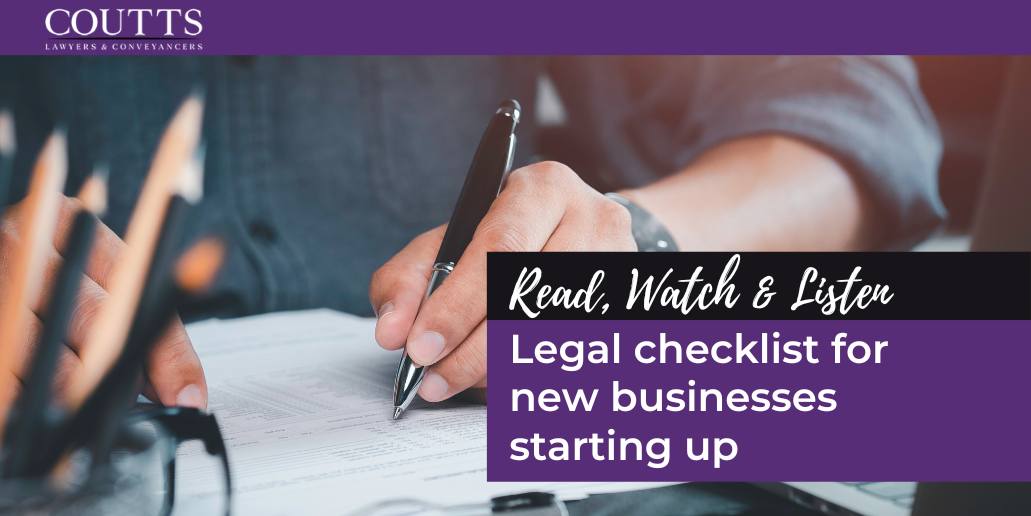Starting a business can be an exciting beginning to the world of being your own boss. Entering the world of entrepreneurship can also be stressful and somewhat daunting. When establishing a business, new owners often run into mountains of legal forms, rules, regulations, licensing, or other policies that can be confusing and time consuming. Failure to understand and comply with these policies can be catastrophic, and sifting through the legal jargon can be complicated. Here we provide you with a basic step-by-step checklist to ensure that your legal needs are met.
Step One: Setting up Your Business
The very first legal obligation of any business is to determine which legal structure the company will take. For example, if you’re selling fresh produce out of your garage, are you a sole proprietor or do you have a partnership with another farmer? If you have a small mechanic shop downtown does that make you a corporation? This decision is essential because laws governing many aspects of the business vary depending on its legal structure.
Step Two: Licensing
Secondly, all new businesses need to be certain they have all the licensing and permits necessary. Permits required for new businesses are different depending on the type of business. If you open a hair salon in your home you may need an occupational license. If you open a new family restaurant, you may need a building permit or a sales permit. Without the correct operating permits and licensing, your business may be shut down before it even begins.
Step Three: Protecting Your Name
The name of your business can be your most valuable asset. It is on every business card, marquee, logo, and billboard. It is important to register the business name to legally identify you to your customers and differentiate yourself from your competitors. It is important to note that registering a business name does not necessarily prevent others from using the same name, only a trade mark can provide that exclusive right. We can provide the assistance to not only register your business name, but protect it from being used by anyone else as well.
Step Four: Establishing the Fine Print
Because of all the complications, changes and details that go into a business agreement, it is important to start off right with detailed and easy-to-understand agreement between owners and customers. For example, if you own a boutique shop, what is your return policy on faulty goods? If you provide a cleaning service, what guarantees are you prepared to give and what are your trading terms if a stain won’t come out? This is often referred to as the “fine print”. Agreements on paper hold people accountable, dictate responsibility and can shape the outcome of the business. It may be a policy posted on a company website, printed on the back of a receipt, or written in a customer contract. The best way to write and establish effective terms of trade is to have the assistance of a solicitor to help you with the fine print.
Step Five: Protecting Yourself
If you are starting a new business, chances are you have some intellectual property. Intellectual property includes anything that you create. It might be a new invention, a unique design, writings, or trade secrets. It is important to protect these innovations with a patent, trademark, or copyright. Navigating the process of obtaining any of these on your own can be extremely difficult. We can provide the help you need to protect you from others who may try to imitate or duplicate your product or service.
Step Six: Employee Basics
Employees are the workhorse of any successful company, to get the best out of your employees, it’s important that you understand the obligations as an employer. This may include paying correct (or above average) wages, providing additional benefits and ensuring safety in working conditions. We can help prevent or defend you from an employee lawsuit that could cause permanent damage to your new business.
Step Seven: Tax Time
Taxes are often thought of as a dirty word, but we are here to simply your business taxes in a way that makes sense. New business taxes include three basic areas: federal, state and local tax. Federal Taxes include the Goods and Services Tax, Pay As You Go withholding tax and Fringe Benefits Tax. State government taxes include payroll tax, land tax, duties and debits tax. Rates vary from council to council around Australia, so it’s important to have a solicitor from Coutts assist you in this process to be sure you accurately complete your registration, taxation, and reporting.
At Coutts Lawyers & Conveyancers, we often deal with start-up businesses who struggle with the legalities of getting up and running. We understand the stress and responsibility that comes with starting your own business and we are here to help alleviate some of the burden. Contact us to speak with one of our experts to give your business the strong foundation necessary to be successful for years to come.



